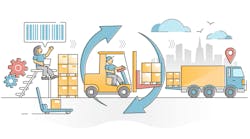As worldwide e-commerce revenues rose more than 20% from 2019 to 2020, technology stepped in to accommodate the growth. Vehicle, robotic, and software automation altered the supply chain landscape in a matter of months according to ABI Research. These changes are expected to continue as both consumer and business digital and contactless behaviors become entrenched.
Evidence of these activities is that limited trials that began prior to 2020 are now attracting government exemptions, revenue-producing activity, and massive investment, the group says.
“The pandemic laid bare existing gaps in digitization, integration, and tenuous contingency plans. explains," Susan Beardslee, Principal Analyst, Freight Transportation & Logistics in a statement. "Additionally, labor shortages have been magnified from volatile product demand, employee quarantines, and seasonal peaks."
Moving toward post-pandemic strategy, longer-term decisions must be made will be better positioned for the next events to occur across the global supply chain, says Beardslee. "Numerous companies are building a future of resilience and agility with greater flexibility and capacity to address the unknown. Some trends have accelerated within months for what was previously part of a 5-year plan,” she added.
Technology adoption is growing rapidly across the supply chain with software and hardware to support vehicle automation, robotics, Artificial Intelligence (AI) and Machine Learning (ML), blockchain, and computer vision systems.
The group gave the example of self-driving truck company TuSimple which partnered with Navistar and Penske on an Autonomous Freight Network (AFN) with the goal of shipping 11,000 industry total SAE Level 4 autonomous commercial vehicles by 2025 in North America.
Asset visibility of vehicles, trailers, and cargo are increasingly required with a diverse list of providers from Verizon to Orbcomm, CalAmp, and Mercedes-Benz Vans’ CoROS with global asset tracking revenue expected to exceed $20 billion by 2025.
“2021 will continue to see expanded investment and adoption of digital, automated and integrated solutions to provide much-needed resiliency in the global supply chain through optimized visibility, flexibility, and reliability,” Beardslee concludes.



